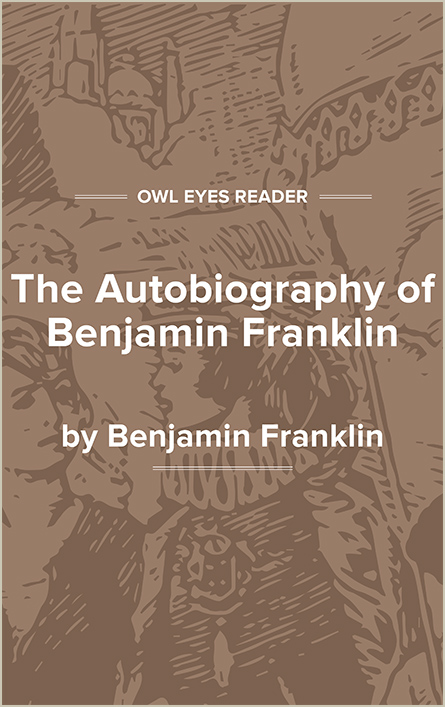Study Guide
Summary
The first part of the Autobiography of Benjamin Franklin (also known as the Autobiography) was begun in 1771. In the work, Benjamin Franklin first addresses his adult son, William. After a few pages about his ancestry and his own birth in Boston as the fourteenth of his father’s seventeen children (and the seventh by his second wife), Franklin tells of being taken from grammar school at the age of ten and put to work for his father, a maker of candles and soap. The young Franklin did not enjoy this work but found consolation in being a leader among the boys in his neighborhood and in being an omnivorous reader.
At the age of twelve, Franklin was apprenticed to his printer brother, James. When the latter started his own newspaper, The New England Courant, Franklin not only worked at printing and delivering the newspaper but also made anonymous contributions, usually of a satirical nature, to the publication.
Franklin had been physically abused by his older brother, who had benefited from Franklin more than he realized. In 1723, Benjamin decided, without consulting his family, to leave home and live on his own. He traveled to New York but found no jobs for a printer. He continued to Philadelphia, where he found work with a printer named Keimer. He lived with the Read family and soon fell in love with young Deborah Read. He also made the acquaintance of Governor William Keith, who suggested that he travel to London for printing supplies. While Franklin was away, Deborah had married another man who, within a few months of their marriage, deserted her.
Franklin returned from London as a clerk for a merchant named Thomas Denham but later worked again for Keimer, from whom he bought a newspaper, the Pennsylvania Gazette. Franklin also adopted the philosophy of Deism, and undertook one of the first of his cultural enterprises: He started the Library Company of Philadelphia, the first circulating library in America. In 1730, he married Deborah, whose marital status was unclear at this time. They had two daughters together and raised Franklin’s son, William.
After a break of seventeen years, Franklin wrote the second part of his Autobiography, turning to an examination of his religious and moral life. Raised as a Presbyterian, he came to believe some of its doctrines “unintelligible, others doubtful” and found greater satisfaction with the principles of Deism. These principles did not, however, provide him with a key to good conduct.
In an attempt to reach “moral perfection,” Franklin consulted his wide range of readings and employed his own judgment to establish a list of thirteen virtues: temperance, silence, order, resolution, frugality, industry, sincerity, justice, moderation, cleanliness, tranquility, charity, and humility. He made charts for each virtue and recorded his daily progress in his pursuit of them. He found the third virtue, order, difficult to obtain but also felt that his efforts made him a better person. The last of his virtues, humility, he added after a Quaker friend told him that he was generally considered proud. Humility, too, proved a difficult virtue, for even if he obtained it, he observed that he would “probably be proud of my humility.”
In the third part of his work, Franklin recounts many of the achievements of his middle years. He learned French, Italian, and Spanish. He filled a number of posts in Pennsylvania’s general assembly. He established a philosophical society and an academy. He became the postmaster of the American colonies. He devised the Franklin stove and conducted many “electrical experiments,” although he does not provide any details about his famous lightning-rod experiments. He studied the causes of fires and established a company to battle them. He devoted considerable time to military preparedness and offered a plan to unify the defenses of the colonies. Despite his dislike of organized religion, he admired the most famous traveling evangelist of his time, George...
(The entire page is 2,202 words.)
Owl Eyes subscribers get unlimited access to our expert annotations, analyses, and study guides on your favorite texts. Master the classics for less than $5/month!

